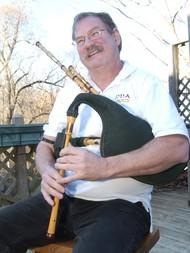What is the big deal about learning music by ear? Does learning by ear help to express  the music better? Does it make it easier to play pipes along with other instruments? Does learning to play a tune by ear make the music more enjoyable?
the music better? Does it make it easier to play pipes along with other instruments? Does learning to play a tune by ear make the music more enjoyable?
Yes, absolutely. Learning tunes by ear is very enjoyable and the tunes become more a part of your soul and less like a mental exercise.
The main strategy I employ when learning a tune without the written notes, is focusing on the 2-bar phrases of the tune. Start with the ending and listen to this ending phrase carefully. As you work through the tune the ending comes up at the end of each part, and it resolves the part.
Then, listen to the first 2-bar phrase in each part. Notice the difference between the first and second part. Often, the first part uses notes on the bottom hand, and the second part uses notes on the top hand.
At this point, I would like to explain how I go about teaching a tune by ear. I am sure that there are many different techniques. I have taught many pipers over the years, and I know that teaching with written music is the accepted practice in pipe bands, and in teaching tunes for competition. However, when you truly wish to learn a tune by ear, keep in mind that when you have completed the tune, you will not only have the notes, and the embellishments memorized, but the flow and expression of the tune will be complete as well.
First, I present to the group learning the tune any oddities, technical challenges, possible pitfalls, or unusual turns. It is best to teach these separately, and add them into the tune when that particular phrase is learned.
Before starting the actual memorization of the tune, I like to demonstrate the call and response of some of the more frequent phrases in the tune. I will play the A phrase then play the B phrase, while noting the light and dark shading between the phrases. For example, the A phrase may be heavy and the B phrase light.
Now, we are prepared to start memorizing the tune. I will play through the whole first part, then start by teaching the ending phrase. Go over this slowly and have each student in the group play along with the instructor, first in the whole group, then two at a time, before giving the student the solo opportunity. This allows all students to hear different variations of the phrase, and also gives students the opportunity to mentally rehearse the phrase.
With practice, a student becomes proficient at learning by ear, and the task of acquiring the phrases becomes easier. Most learners can pick up a phrase after hearing it played three times. I find that a piper has the phrase memorized when he can play it three times correctly without any mistakes. Then it is time to progress to the next phrase.
After the first two phrases are successfully memorized, then tie the phrases together and play the 2 phrases over three times slowly, then a little faster. Make any corrections and suggestions for flow and contrast.
Then, I play the third phrase, which is usually just like the first phrase, with the ending phrase. I repeat this 3 times as before. Now, it should be no problem playing the whole part.
These steps can be accomplished with a teacher at first, then the piper can practice learning by ear on his own, by listening to recorded tunes if not played too quickly. Once the phrase is mastered, I suggest picking up the tempo as part of the learning process.
Teaching music takes patience, and teaching by ear requires greater patience and a keen ear to pinpoint and make immediate corrections. The objective for a lesson is usually to master an entire tune, or an entire part, during one session. Students can refer to the manuscript after the initial session to refresh their memory of the exact notes. It is also a good idea for students to make a recording of the tune played by the instructor slowly, and then a little faster, for future reference.
I am sure that there are various methods of teaching / learning to play by ear, however, I have studied with about 6 accomplished teachers, and each pretty much taught the class using this method. I would be very interested in further insights and suggestions to help pipers acquire the skills for learning by ear.
Robert Mitchell began piping at 9 years of age and comes from a piping family that started with his father, Albert Mitchell. He is recognized as a successful solo competitor in the U.S., Canada, and Scotland. He is also an accomplished studio musician with over thirty years experience performing extensively throughout the Washington, D.C., Baltimore areas, and nationally, playing the Great Highland Bagpipes and the Scottish Small Pipes.